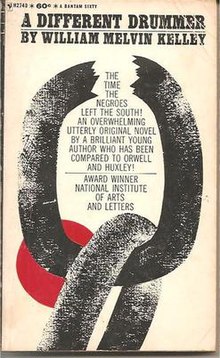
Walden is a book by American transcendentalist writer Henry David Thoreau. The text is a reflection upon the author's simple living in natural surroundings. The work is part personal declaration of independence, social experiment, voyage of spiritual discovery, satire, and—to some degree—a manual for self-reliance.
The one-drop rule was a legal principle of racial classification that was prominent in the 20th-century United States. It asserted that any person with even one ancestor of black ancestry is considered black. It is an example of hypodescent, the automatic assignment of children of a mixed union between different socioeconomic or ethnic groups to the group with the lower status, regardless of proportion of ancestry in different groups.
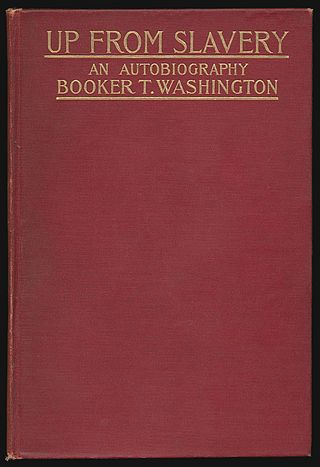
Up from Slavery is the 1901 autobiography of the American educator Booker T. Washington (1856–1915). The book describes his experience of working to rise up from being enslaved as a child during the Civil War, the obstacles he overcame to get an education at the new Hampton Institute, and his work establishing vocational schools like the Tuskegee Institute in Alabama to help Black people and other persecuted people of color learn useful, marketable skills and work to pull themselves, as a race, up by the bootstraps. He reflects on the generosity of teachers and philanthropists who helped educate Black and Native Americans. He describes his efforts to instill manners, breeding, health and dignity into students. His educational philosophy stresses combining academic subjects with learning a trade. Washington explained that the integration of practical subjects is partly designed to "reassure the White community of the usefulness of educating Black people".
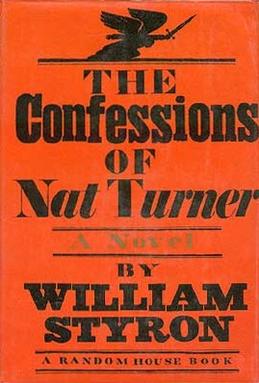
The Confessions of Nat Turner is a 1967 Pulitzer Prize-winning novel by American writer William Styron. Presented as a first-person narrative by historical figure Nat Turner, the novel concerns Nat Turner's slave rebellion in Virginia in 1831, but does not always depict the events accurately. It is based on The Confessions of Nat Turner: The Leader of the Late Insurrection in Southampton, Virginia, a first-hand account of Turner's confessions published by a local lawyer, Thomas Ruffin Gray, in 1831.

Iola Leroy, or Shadows Uplifted, an 1892 novel by Frances E. W. Harper, is one of the first novels published by an African-American woman. While following what has been termed the "sentimental" conventions of late nineteenth-century writing about women, it also deals with serious social issues of education for women, passing, miscegenation, abolition, reconstruction, temperance, and social responsibility.
In societies that regard some races or ethnic groups of people as dominant or superior and others as subordinate or inferior, hypodescent refers to the automatic assignment of children of a mixed union to the subordinate group. The opposite practice is hyperdescent, in which children are assigned to the race that is considered dominant or superior.

Caliban is a fictional character appearing in American comic books published by Marvel Comics. He first appeared in The Uncanny X-Men #148, by writer Chris Claremont and artist Dave Cockrum. A mutant with the ability to sense other mutants, he was originally a member of the Morlocks. He was also a member of the X-Factor, X-Men, X-Force and The 198. He was chosen twice by Apocalypse as one of the Horsemen of Apocalypse, first as Death and the second time as Pestilence, and Apocalypse also enhanced his superpowers through genetic manipulation.

Edward Barry Kelley was an American actor on Broadway in the 1930s and 1940s and in films during the 1940s, 1950s, and 1960s. The heavy-set actor created the role of Ike in Oklahoma! on Broadway. His large size and acting range had him playing primarily judges, detectives, and police officers.
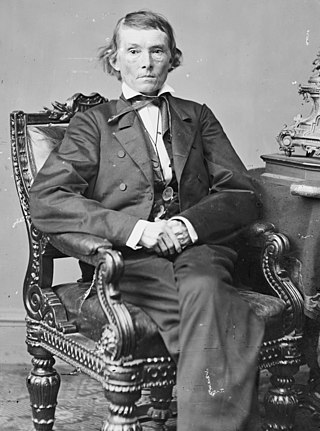
The Cornerstone Speech, also known as the Cornerstone Address, was an oration given by Alexander H. Stephens, acting Vice President of the Confederate States of America, at the Athenaeum in Savannah, Georgia, on March 21, 1861.
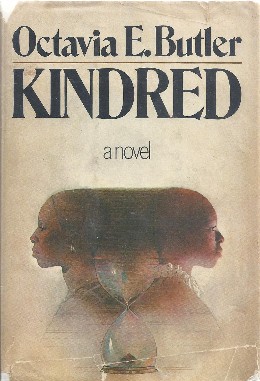
Kindred (1979) is a novel by American writer Octavia E. Butler that incorporates time travel and is modeled on slave narratives. Widely popular, it has frequently been chosen as a text by community-wide reading programs and book organizations, and for high school and college courses.

Anthony Johnson was an Angolan-born man who achieved wealth in the early 17th-century Colony of Virginia. Held as an indentured servant in 1621, he earned his freedom after several years, and was granted land by the colony.

A Sojourn in the City of Amalgamation, in the Year of Our Lord, 19-- is a dystopian novel written by Jerome B. Holgate (1812–93) under the pseudonym of Oliver Bolokitten. It was self-published by the author in New York in February 1835. The novel criticizes abolitionists by describing them as endorsers of "amalgamation", or interracial marriage. The narrator encounters a future city, Amalgamation, where white people and black people have intermarried solely for the sake of racial equality, resulting in "moral degeneration, indolence, and political and economic decline." The work is one of the first uses of a satirical novel, speaking against interracial marriage and for black recolonization. The novel is also one of the earliest pieces of dystopian fiction.
Buck and the Preacher is a 1972 American Western film released by Columbia Pictures, written by Ernest Kinoy and directed by Sidney Poitier. Poitier also stars in the film alongside Harry Belafonte and Ruby Dee.

Blaxploitation is an ethnic subgenre of the exploitation film that emerged in the United States during the early 1970s. The term, a portmanteau of the words "black" and "exploitation", was coined in August 1972 by Junius Griffin, the president of the Beverly Hills–Hollywood NAACP branch. He claimed the genre was "proliferating offenses" to the black community in its perpetuation of stereotypes often involved in crime. The genre does rank among the first after the race films in the 1940s and 1960s in which black characters and communities are the protagonists and subjects of film and television, rather than sidekicks supportive characters, antagonists or victims of brutality. The genre's inception coincides with the rethinking of race relations in the 1970s.

William Melvin Kelley was an African-American novelist and short-story writer. He is perhaps best known for his debut novel, A Different Drummer, published in 1962. He was also a university professor and creative writing instructor. In 2008, he received the Anisfield-Wolf Book Award for Lifetime Achievement. Kelley is credited with being the first to commit the term "woke" to print, in the title of a 1962 New York Times op-ed on the use of African-American slang by beatniks: "If You're Woke, You Dig It".

On November 7, 1978, Washington, D.C., held the second election for its mayor as a result of the District of Columbia Home Rule Act. The primary election of the Democratic Party took place on Tuesday, September 12, with At-Large Councilman Marion Barry defeating incumbent mayor Walter E. Washington and Council Chair Sterling Tucker to become the Democratic nominee for Mayor. Barry defeated Republican nominee Arthur Fletcher and two marginal candidates in the general election on November 7, 1978.

Anti-racism encompasses a range of ideas and political actions which are meant to counter racial prejudice, systemic racism, and the oppression of specific racial groups. Anti-racism is usually structured around conscious efforts and deliberate actions which are intended to create equal opportunities for all people on both an individual and a systemic level. As a philosophy, it can be engaged in by the acknowledgment of personal privileges, confronting acts as well as systems of racial discrimination and/or working to change personal racial biases. Major contemporary anti-racism efforts include the Black Lives Matter (BLM) movement and workplace anti-racism.
John H. Van Evrie (1814–1896) was an American physician and defender of slavery best known as the editor of the Weekly Day Book and the author of several books on race and slavery which reproduced the ideas of scientific racism for a popular audience. He was also the proprietor of the publishing company Van Evrie, Horton & Company. Van Evrie was described by the historian George M. Fredrickson as "perhaps the first professional racist in American history." His thought, which lacked significant scientific evidence even for the time, emphasized the inferiority of black people to white people, defended slavery as practiced in the United States and attacked abolitionism, while opposing class distinctions among white people and the oppression of the white working class. He repeatedly put "slave" and "slavery" in quotation marks, because he did not think these were the right words for enslaved Blacks.
The lynching of the Walker family took place near Hickman, Fulton County, Kentucky, on October 3, 1908, at the hands of about fifty masked Night Riders. David Walker was a landowner, with a 21.5-acre (8.7 ha) farm. The entire family of seven African Americans including parents, infant in arms, and four children were killed, with the event reported by national newspapers. Governor Augustus E. Willson of Kentucky strongly condemned the murders and promised a reward for information leading to prosecution. No one was ever prosecuted.
Grace Bustill Douglass was an African-American abolitionist and women's rights advocate. Her family was one of the first prominent free black families in the United States. Her family's history is one of the best documented for a black family during this period, dating from 1732 until 1925.
